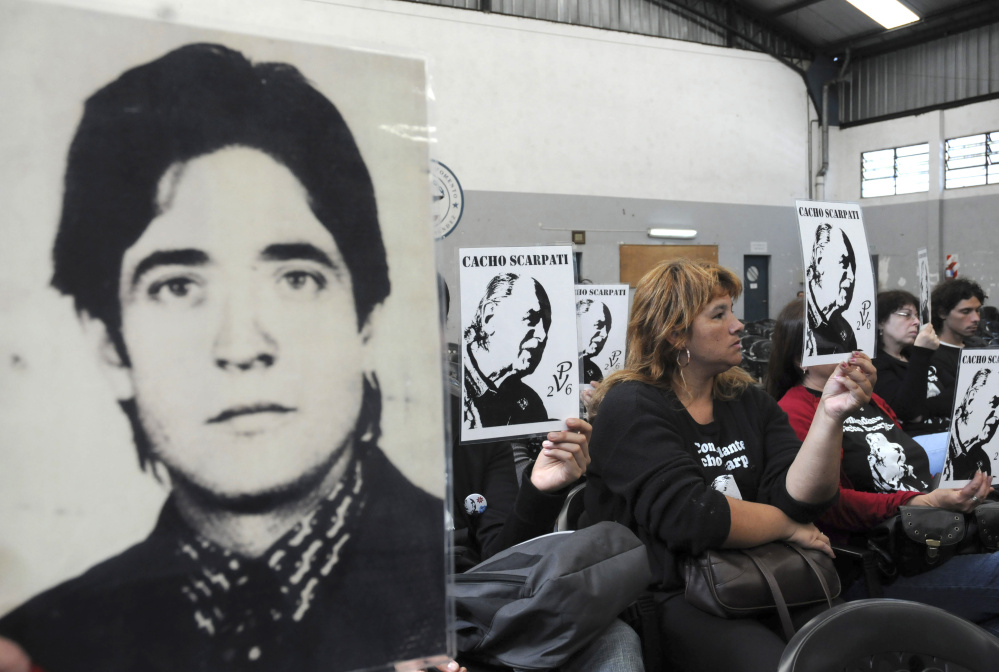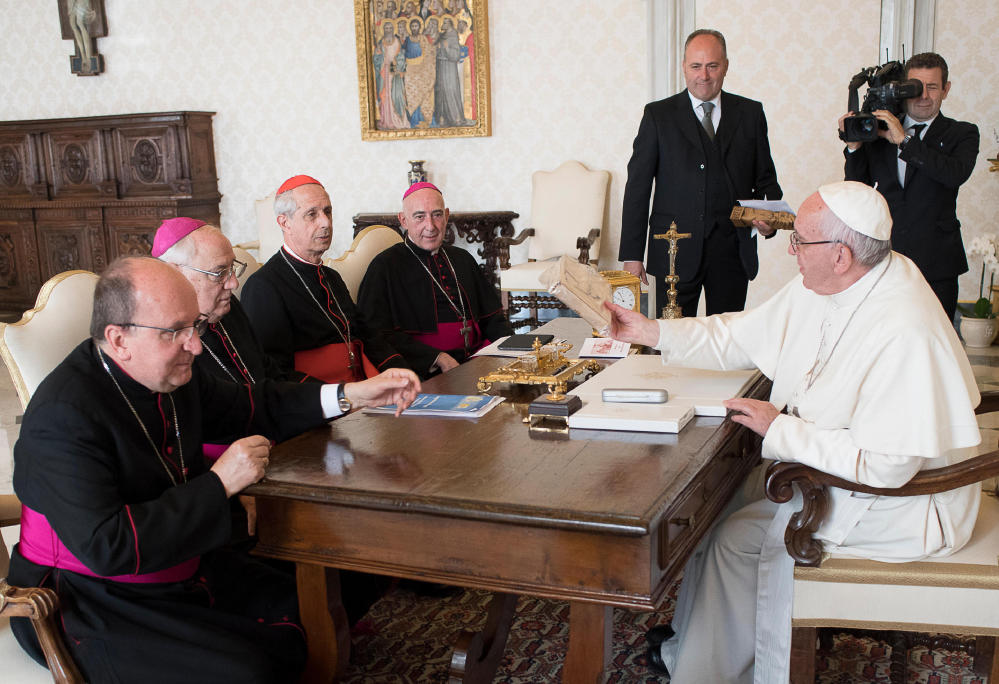VATICAN CITY — The Vatican and Argentina’s bishops have finished cataloguing their archives from the country’s “dirty war” and will soon make them available to victims and their relatives who have long accused church members of complicity with the military dictatorship. The 3,000 files being released, though, are a fraction of the documentation believed to be in the possession of the Argentine church.
A joint statement Tuesday by the Vatican and the Argentine bishops’ conference said the process of digitizing the archives had been completed and that procedures to access the information would be forthcoming. No date was set, and the opening for now is restricted to victims, detainees, their relatives and the religious superiors of victims who were priests or nuns.
Official estimates say between 7,600-13,000 people were killed or disappeared in a government-sponsored crackdown on leftist dissidents during Argentina’s 1976-1983 “dirty war.” Human rights activists believe the real number was as high as 30,000.
Many senior clerics were close to Argentina’s military rulers at the time and human rights groups have accused them of complicity with the regime.
The statement said the decision to open the church’s archives was taken at the express direction of Pope Francis, “in the service of truth, justice and peace.”
A FIRST STEP
Francis – then the Rev. Jorge Mario Bergoglio – was the young Jesuit superior in Argentina during the military dictatorship, making his decision to open the archives all the more remarkable. The Argentine bishops’ conference, which Bergoglio headed until 2011, began cataloguing the archives soon after his term ended.
“We’re not afraid of the files,” said Cardinal Mario Poli, the archbishop of Buenos Aires. “We’re making them available in the pursuit of reconciliation, truth and justice.”
Relatives of victims welcomed the development as a first step, but expressed disappointment that the files will only include an estimated 3,000 documents, most of them believed to be letters from Argentines to church authorities seeking information about their “disappeared” loved ones. That is likely a fraction of the documentation in existence since the archives of religious orders and individual parishes were not included in the cataloguing project, officials said.
“There’s no centralized archive,” Monsignor Jose Arancedo, who succeeded Bergoglio as president of the Argentine bishops’ conference, said Tuesday in Buenos Aires. “We hope that the work done here is also done in other instances of the church.”
Dora Salas, a member of the group Families of the Disappeared and Held for Political Reasons, said the release “is the beginning of a new road, a whole new step.” Salas was kidnapped with her partner in 1977; she was released with her two young children but her partner was forcibly disappeared. “I think that this will lead to important things but I also believe that also there is a very long road ahead and that there is still a lot missing,” she said, citing parish files, military files and other documentation.
Francis himself had been criticized for not speaking out publicly about the atrocities while a high-ranking Jesuit. But he has also been credited with saving the lives of more than two dozen people, giving them sanctuary in his seminary and helping spirit them out of the country.
The documents concern archives held in the Vatican secretariat of state, the Vatican’s Buenos Aires embassy and the Argentine bishops’ conference. Most would normally never be made public, and in the case of the Vatican archives, they would only become available to academics starting around 2075.
Vatican spokesman Greg Burke stressed that for now the archives would only be open to victims and their relatives, not academics. He suggested that a broader opening could be later.
Activists say the church has yet to fully apologize for its human rights record, identify those responsible for the many violations the church knew about at the time, or lead Argentina’s justice system to bodies and to people who were stolen as babies from their birth families. Francis has said when he ran Argentina’s bishops’ conference in the 1990s no such evidence existed in church files.
PONTIFF ALLEGEDLY REMISS
The most damning accusation against Francis himself is that as the military junta took over in 1976, he withdrew his support for two slum priests whose activist colleagues in the liberation theology movement were disappearing. The priests were then kidnapped and tortured at the Navy Mechanics School, which the junta used as a clandestine prison.
Francis said he had told the priests – Orlando Yorio and Francisco Jalics – to give up their slum work for their own safety, and they refused.
He testified as part of a human rights trial in 2010 that to save them, he persuaded another priest to fake an illness so that he could hold a private Mass for dictator Jorge Videla and personally plead for the Jesuits’ release. They were set free in October 1976, left drugged and blindfolded in a field.
Yorio, who is now dead, later accused Francis of effectively delivering them to the death squads by declining to publicly endorse their work. But Jalics has said he and Francis have reconciled and that he considers the matter closed.
Francis’ decision to open the church’s archives raises the question of whether he will do the same elsewhere in Latin America, where some members of the church and Vatican hierarchy were seen as being aligned with right-wing dictatorships that targeted leftists in El Salvador, Chile, Nicaragua and elsewhere, even while fellow priests were being targeted.
It also begs the question of when the Vatican will open its archives into its World War II-era pope, Pius XII, long criticized by Jewish groups as having stayed silent in the face of the Holocaust.
The Vatican usually waits 70 years after the end of a pontificate to open its archives. But it has been under pressure to accelerate the Pius catalogue so the documents can be made public before the generation of Holocaust survivors dies.
Asked if the Argentine exception to the 70-year rule set a precedent for the Pius archives, Burke said to wait and see, suggesting a development was expected in the not-too-distant future.
Copy the Story LinkSend questions/comments to the editors.




Success. Please wait for the page to reload. If the page does not reload within 5 seconds, please refresh the page.
Enter your email and password to access comments.
Hi, to comment on stories you must . This profile is in addition to your subscription and website login.
Already have a commenting profile? .
Invalid username/password.
Please check your email to confirm and complete your registration.
Only subscribers are eligible to post comments. Please subscribe or login first for digital access. Here’s why.
Use the form below to reset your password. When you've submitted your account email, we will send an email with a reset code.